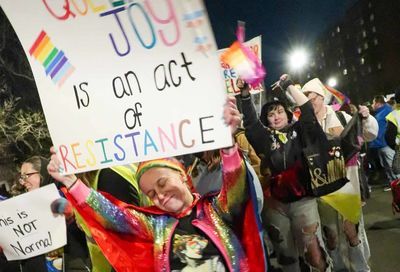House GOP Leaders Say Court Should Dismiss Edith Windsor’s Lawsuit, Find DOMA Constitutional
The House Bipartisan Legal Advisory Group (BLAG) has been defending the Defense of Marriage Act (DOMA) in court since President Barack Obama and Attorney General Eric Holder announced on Feb. 23 that the Department of Justice would no longer defend Section 3 of the law – the federal definition of marriage.
 In one of those cases – Edith Windsor’s challenge to the law because of the $350,000 estate tax bill she was ordered to pay following the death of her wife, Thea Spyer – BLAG on Aug. 1 filed its motion to dismiss the case, arguing that Windsor does not have a legal claim to make because DOMA is constitutional. Additionally, BLAG – led by the House Republican leadership – filed its opposition to her motion for summary judgment, which Windsor’s lawyers had filed in late June.
In one of those cases – Edith Windsor’s challenge to the law because of the $350,000 estate tax bill she was ordered to pay following the death of her wife, Thea Spyer – BLAG on Aug. 1 filed its motion to dismiss the case, arguing that Windsor does not have a legal claim to make because DOMA is constitutional. Additionally, BLAG – led by the House Republican leadership – filed its opposition to her motion for summary judgment, which Windsor’s lawyers had filed in late June.
In the dueling filings, BLAG’s lawyers – led by attorney Paul Clement of Bancroft PLLC – argue that same-sex marriages are not a fundamental right and that sexual orientation classifications should not be subjected to any heightened scrutiny. Windsor’s lawyers, on the other hand, argue that marriage is a fundamental right and that sexual orientation classifications should be subjected to heightened scrutiny. Although the argument seems semantic, the answers to these questions could have a significant impact on whether DOMA stands.
Under the 14th Amendment – applied to the federal government through the Fifth Amendment – all laws that affect fundamental rights or classify people into groups receive a level of scrutiny: rational basis, which is the lowest form of scrutiny; intermediate scrutiny; or strict scrutiny.
The U.S. Supreme Court has not made a determination about the level of scrutiny to apply to sexual orientation classifications, even in the two cases in which it struck down anti-LGBT laws – Romer v. Evans and Lawrence v. Texas. If a fundamental right is impacted, that too triggers heightened scrutiny.
If heightened scrutiny is found to apply, then the law will be found to be unconstitutional unless – depending on the level of review – the government shows an important or compelling interest is advanced by the law. If the lowest level of scrutiny applies, then the law is presumed to be constitutional and the court must only find a legitimate interest to be advanced.
In the filings, BLAG gives several interests advanced, including that “caution” was appropriate in the face of “a proposed novel redefinition of the foundational social institution.” BLAG argues, “As an empirical matter, the long-term social consequences of granting legal recognition to same-sex relationships remain unknown.”
Later, BLAG goes on to argue, “Whether or not same-sex marriages are as beneficial to society as traditional marriage in other respects, it would have been reasonable for Congress to have been concerned that defining same-sex relationships as ‘marriages,’ despite the fact that they necessarily cannot result in children without assistance—and are (and particularly in 1996, were) less likely to involve children—would weaken society’s understanding of the importance of marriage for children.”
In her earlier filing, Windsor argued, far from being dismissed, her case should succeed without the need for a trial because she is right on the legal arguments and there are no factual disputes. Her lawyers – led by Roberta Kaplan of Paul, Weiss, Rifkind, Wharton & Garrison LLP – note that “under the Constitution, discriminatory classifications cannot merely perpetuate past stereotypes or enforce prior discrimination.”
Windsor’s filing continued: “Thus, the fact that lesbians and gay men have historically been denied access to marriage cannot provide the necessary independent basis for the federal government’s disregard of existing state-approved marriages of same-sex couples today.”
Additional filings – including by the Department of Justice – could still be filed in coming weeks before the briefing will be completed in the case about a month from now.
* * *
Additionally, a dispute in the case that arose during the discovery, or evidence-gathering, portion of the case was recently resolved.
In a letter filed with the court on July 18, Windsor’s lead attorney, Roberta Kaplan of Paul, Weiss, Rifkind, Wharton & Garrison LLP, noted to Magistrate Judge James Francis that BLAG chose to intervene in the case and that “the obligations that come with party status include good faith participation in and compliance with the discovery process.”
The disputre surrounded requests asking for BLAG to admit what Windsor’s lawyers claimed were certain facts — such as that “lesbians and gay men have experienced a history of unequal treatment in the United States because of their sexual orientation” — and to respond to certain questions — including what interests that BLAG will be arguing are advanced by DOMA.
In an order from Francis filed on July 28, he granted some of the requests and denied others — ordering BLAG to explain what interests it will be arguing are advanced by DOMA and to admit whether, “at the time of her death, Thea Spyer had been married to a man instead of a woman … her estate would have qualified for the estate tax marital deduction.” He denied, however, the request that BLAG several other questions, which he characterized as “seek[ing] admissions about sweeping historical and sociological phenomena.” He concluded that “[r]equests for admission are ill-suited to such complex issues.”
Of the granted requests, though, the plaintiff did get BLAG’s lawyers to state on Aug. 1:
Defendant admits that Plaintiff has submitted documents that, if accurate, establish the eligibility of Spyer’s estate for the estate tax marital deduction and that the estate would not have been liable for federal estate tax, if Spyer had been married to a surviving male U.S. citizen at the time of her death.
But for Windsor and Spyer’s sex, in other words, BLAG agrees that the estate tax marital deduction would have applied.
* * *
READ:
- Judge Francis’s order: Francis Order.pdf
- BLAG’s admission: Windsor Admissions Responses (Supplemental) 7-29.pdf
- BLAG’s claimed DOMA interests: Windsor Interrogatory Responses (Supplemental).pdf
- Windsor’s Motion for Summary Judgment: MotionSJ.pdf
- BLAG’s Opposition to the Motion for Summary Judgment: OpptoMotforSummJ.pdf
- BLAG’s Motion to Dismiss: MTDMemo with Exhibits.pdf
Support Metro Weekly’s Journalism
These are challenging times for news organizations. And yet it’s crucial we stay active and provide vital resources and information to both our local readers and the world. So won’t you please take a moment and consider supporting Metro Weekly with a membership? For as little as $5 a month, you can help ensure Metro Weekly magazine and MetroWeekly.com remain free, viable resources as we provide the best, most diverse, culturally-resonant LGBTQ coverage in both the D.C. region and around the world. Memberships come with exclusive perks and discounts, your own personal digital delivery of each week’s magazine (and an archive), access to our Member's Lounge when it launches this fall, and exclusive members-only items like Metro Weekly Membership Mugs and Tote Bags! Check out all our membership levels here and please join us today!




















